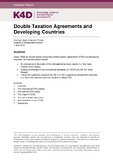| dc.contributor.author | Quak, Evert-jan | |
| dc.contributor.author | Timmis, Hannah | |
| dc.date.accessioned | 2018-06-29T09:50:26Z | |
| dc.date.available | 2018-06-29T09:50:26Z | |
| dc.date.issued | 2018-06-01 | |
| dc.identifier.citation | Quak, E. and Timmis, H. (2018). Double Taxation Agreements and Developing Countries. K4D Helpdesk Report. Brighton, UK: Institute of Development Studies. | en |
| dc.identifier.uri | https://opendocs.ids.ac.uk/opendocs/handle/20.500.12413/13839 | |
| dc.description.abstract | The literature estimates that approximately 3,000 Double Taxation Agreements (DTAs) are in force, which could be a fraction of the number of potential bilateral tax relationships, as there is no centralised, complete and public database. The overwhelming majority of bilateral DTAs are based, in large part, on the OECD Model Tax Convention on Income and on Capital (OECD Model) and the UN Model Double Taxation Convention between Developed and Developing Countries (UN Model). The key difference between the Models is that the UN Model preserves a greater share of taxing rights for the source country (i.e. the country where investment takes place). The literature shows that between two economies with largely reciprocal Foreign Direct Investment (FDI) positions, the reallocation of taxing rights towards the residence country after signing a DTA is not that problematic. According to the literature, there is significant FDI asymmetry and capacity asymmetry in negotiations between high income countries and low-income countries, impacting the outcome of DTAs. | en |
| dc.language.iso | en | en |
| dc.publisher | Institute of Development Studies | en |
| dc.relation.ispartofseries | K4D Helpdesk Report; | |
| dc.rights.uri | https://www.nationalarchives.gov.uk/doc/open-government-licence/version/3/ | en |
| dc.subject | Economic Development | en |
| dc.subject | Finance | en |
| dc.title | Double Taxation Agreements and Developing Countries | en |
| dc.type | Other | en |
| dc.rights.holder | DFID | en |
| dcterms.dateAccepted | 2018-06-01 | |
| rioxxterms.funder | Default funder | en |
| rioxxterms.identifier.project | K4D | en |
| rioxxterms.version | NA | en |
| rioxxterms.funder.project | 0986883a-6d0f-4bb8-9c46-5e0682934d65 | en |

